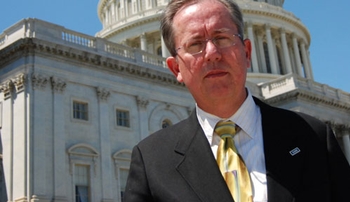Scientists, meet your lawmakers. Talk to them. Tell them how the National Institutes of Health funding process works.
Tell them about your labs and about the workers who staff them. Tell how the funding you receive supports these workers and by extension the local economy.
 |
Mark Lively, Ph.D. |
“Many scientists who rely on federal funding don’t have a full appreciation of the budget process and my message to these scientists is that your voice counts and it’s very important to express it,” said Dr. Lively, a professor in the Wake Forest School of Medicine Department of Biochemistry who will present “The Essential Role of Scientists in Public Advocacy” at noon on Monday in the Durham Research Center Auditorium.
Powerfully uninformed
Many lawmakers operate with serious misconceptions about how the funding process works, said Dr. Lively, who served as president of the Federation of American Societies of Experimental Biology (FASEB) and is presently a member of the NIH’s Council of Councils, which directly advises NIH director Frances Collins on how to distribute money from the NIH’s $500 million common fund.
“Many in congress don’t understand the divisions of the NIH, nor do they realize that the vast majority of money set aside for the NIH is not spent at its headquarters in Bethesda, Md., but rather at institutions such as UNMC,” Dr. Lively said. “We can and should educate our lawmakers on how this works and how this funding affects their constituents.”
A vital time for advocacy
This is particularly important as federal budgets continue to tighten, Dr. Lively said, pointing to the potential “budget sequester” that may go into effect early next year and lead to drastic budget cuts for federal entities such as the NIH.
So make contact with lawmakers. Write letters to the editors of your local papers. Get involved in professional organizations and get your side of the story told, Dr. Lively said.
“We need to put real stories in front of the lawmakers so they can see how this funding helps their people and conversely how funding cuts cause damage,” Dr. Lively said.